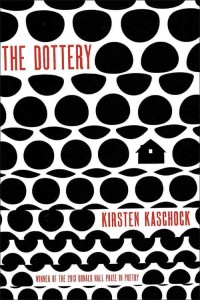 Book Title, Press, Year of Publication:
Book Title, Press, Year of Publication:
The Dottery, University of Pittsburgh Press, 2014
Synopsis: The book is a thought experiment: what if gender was assigned, and taught, pre-womb?
What do you think makes your book (or any book) a “project book”?
In my case, poems circled like bricks around a shithouse. What I mean to say is that I didn’t choose this project. The idea of this one-room education center became an obsession I tried several times to evacuate myself of—only to find more poems.
Why this subject (or constraint)?
I have three sons. My husband (a molecular geneticist) was working on a gene called “daughterless” that causes fruit flies only to produce male offspring. The word, the idea of some outside force determining gender, it lodged inside me somewhere. The majority of the poems are blocks of text… like bricks.
Are you comfortable with the term “project book”?
Absolutely. What else would you call it? A rectangular obsession repository?
Was your project defined before you started writing? To what degree did it develop organically as you added poems?
No. I wrote one. Then another. Over three years, 80 pages worth. No outline, no safety net.
Did you allow yourself to break your own rules?
When you break no rules, do you make some? I never did.
How important was it for you that each poem could “stand on its own” or that the poems should rely on other poems in the book, or on the premise of the project itself, to succeed? What challenges did this present for you when writing single poems or structuring the book overall?
The poems were each their own moments, terracotta beads on a rosary. But they all hung together. There were no titles for any of them, for example, except in the fear section, which chronicles the lives (and deaths) of a few dotters once they make it out into the world. Those look like obituaries and for awhile, I didn’t know they were part of this book (though clearly related).
At any point did you feel you were including (or were tempted to include) weaker poems in service of the project’s overall needs? This is a risk, and a common critique, of many project books. How did you deal with this?
I excised a few poems during my arrangement of these. They weren’t weaker, but the tone in them changed. I wanted to maintain this semi-located drifting narration. It moves from an omniscient textbook voice to an accuser to a would-be mutter (a mutterer) and back again. But the tone in the ones I took out was less sci-fi, more memoir. Those just weren’t right.
Did you fully immerse yourself in writing this project book, or did you allow yourself to work on other things?
I’m always working on other things. This is not a question I think I’ll ever answer affirmatively unless the immersion referred to is in chaos. I was working on other poetry, a novel, children, dance reviews, teaching.
Do you have a sense of whether the fact that this is a project book helped position it to find publication more easily? Has it helped you find readers?
I never thought about it, honestly. I write what I need to write, then send it out. That’s my process. My father keeps asking me why I don’t try to write a bestseller, but fathers can be like that. (And daughters will continue to ignore them and yet hear everything they say ringing in perpetuity.) I think this project has a sense of momentum… not plot exactly, but a wondering-where-this-is-going sort of forward thrust. It might be part of why it won a prize, that cohesive pull. I’d like to think so—it’s one of my favorite things about the book.
As a reader, are you drawn to project books? What project books have influenced you or have you enjoyed, and what do you think makes those books successful?
Bluets by Maggie Nelson. The Self Unstable by Elisa Gabbert, The Age of Wire and String by Ben Marcus, all of Patrick Lawler and Sabrina Orah Mark’s work. Francis Ponge. Rilke. I identify with continuity driven by obsession absolutely.
What effect do you think the prevalence of project books is having on poetry in general?
I’m a dance critic. Stephen Burt or Daniel Tiffany should weigh in here.
Have you abandoned other project attempts? How did you know it was time to let go? What happens to project poems that never amass a full-length book?
I don’t abandon much. The smaller ones are born as chapbooks—see my WindowBoxing from Bloof Books, and many of Bloof’s other fantastic works.
After completing a project, how did you transition into writing something new? What are you working on now? Another project?
The Rate at Which She Travels Backwards is a sci-fi novel about a world where artists shroud their work in nothingness to provide a respite from the overproliferation of input. I’m on my second draft of it. It has been a project like no other.
What advice can you offer other writers, particularly emerging writers or poetry students who may be using the project book as a guiding principle for their own work?
Not advice, but I can maybe offer comfort: if you need to do it, don’t worry about its bigness and messiness. You can figure it out. You’re smart. And if you don’t need to do it, that’s okay too. Leave it. A half-finished house can provide its own kind of beauty and impetus. I think half-mades are a fascinating idea… maybe that’s my new project: Unfinishedness. Yep. That’s a forgiving sort of thing.


